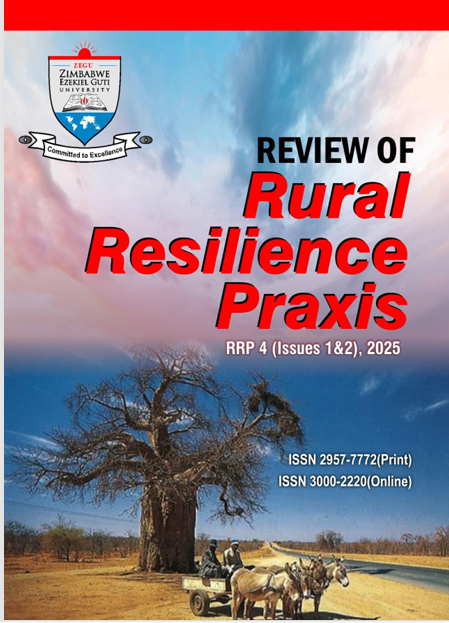Rural Community Resilience in Zimbabwe: The Gaps, Myths and Realities
DOI:
https://doi.org/10.71458/nsbd3g60Keywords:
capacity building, resilience building, community development, food insecurity, poverty, sustainabilityAbstract
The article explores various views and complexities of rural community resilience in Zimbabwe. Although rural communities are often praised for their resilience in the face of adversity; the complexity of this resilience is frequently misunderstood or oversimplified. The study employs a systematic review approach to ensure rigor, transparency and replicability in examining rural community resilience in Zimbabwe. The review follows the Preferred Reporting Items for Systematic Reviews and Meta-Analyses (PRISMA) guidelines. A set of inclusion and exclusion criteria guided the selection process. Peer-reviewed articles and reports focusing on rural resilience in Zimbabwe, particularly in the context of climate change, socio-economic challenges, governance, indigenous knowledge systems, gender dynamics and development interventions, are included. The article highlights the critical role of Indigenous Knowledge Systems (IKS) in building rural community resilience in Zimbabwe. Although traditional knowledge is often overlooked in modern resilience building strategies, an integrated approach that combines both traditional and modern methods is essential for sustainable resilience building. Such an approach challenges common myths about rural communities suggesting that they are overly reliant on external aid yet, in essence, they have strong social networks and community solidarity which play a crucial role in enhancing resilience, demonstrating the significance of social capital in problem-solving and adaptation. Despite the importance of local knowledge and expertise, the literature indicates that rural community participation in disaster and climate resilience planning remains limited. Most strategies are designed and implemented by external stakeholders with minimal local involvement, threatening the long-term sustainability of resilience initiatives. To address this, the study recommends inclusive participation, ensuring that all stakeholders are actively involved in every stage, from problem identification to implementation and evaluation. Strengthening local ownership of resilience strategies is crucial to their success and sustainability




